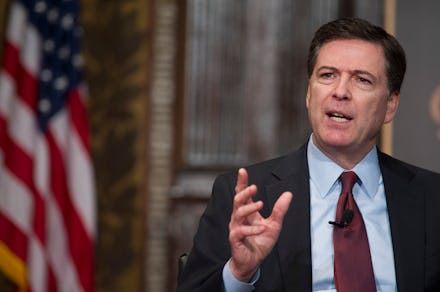The Head of the FBI Just Challenged Cops to Face Their Own Racial Bias

FBI Director James Comey challenged law enforcement officials Thursday to fight "cynicism" and reject "lazy mental shortcuts" in their dealing with individuals in minority communities.
"We must better understand the people we serve and protect — by trying to know, deep in our gut, what it feels like to be a law-abiding young black man walking on the street and encountering law enforcement," Comey said in a speech at Georgetown University in Washington, D.C. "We must understand how that young man may see us."
Hard truths: Comey laid out a series of "hard truths" he believes Americans must confront if the country is to salvage something from generations of biased police conduct and, before that, hundreds of years of racial violence and slavery.
"That experience should be part of every American's consciousness, and law enforcement's role in that experience, including in recent times, must be remembered. It is our cultural inheritance," he said, before quoting from the hit Broadway musical Avenue Q, which richly observed that "Everyone's a little bit racist."
Comey also addressed the stinging public debate surrounding the killings of two New York Police Department officers, Rafael Ramos and Wenjian Liu, in December 2014. The rhetorical clashes that followed, during which the head of a police union accused New York City Mayor Bill de Blasio of having "blood on his hands," have brought the country to "a crossroads," Comey declared.
"We can turn up the music on the car radio and drive around these problems," he said. "Or we can choose to have an open and honest discussion about what our relationship is today — what it should be, what it could be, and what it needs to be — if we took more time to better understand one another."
Like Holder? The tone of Comey's comments immediately brought to mind another top federal law enforcement official, Attorney General Eric Holder. In the weeks after President Barack Obama's first inauguration in 2009, Holder said that, on matters of race, the U.S. remained "a nation of cowards" and that only "if we are to make progress in this area we must feel comfortable enough with one another, and tolerant enough of each other, to have frank conversations about the racial matters that continue to divide us."
But unlike Holder, Comey, who is white, has seen his comments met with applause from most prominent observers. Both the New York Times and Washington Post described the speech "unusually frank." Critics, however, took issue with Comey's suggestion that the public needs "to give them the space and respect to do their work, well and properly."
"Since when do police in the U.S. get too little respect?" the Intercept's Juan Thompson asked. "This is a country that reveres and worships police officers. Go to a basketball game and you will see cops honored during halftime. Offer mild criticism of the police, as New York Mayor Bill de Blasio did last year, and you will be pilloried and labeled anti-police. Show faint solidarity with the #blacklivesmatter demonstrators, as the St. Louis Rams did, and fans will turn against you and organize boycotts."
A long road ahead: Despite some obvious shortcomings, Comey's speech went unusually far in articulating the missteps and failures of modern American law enforcement. He challenged police officers to "re-double our efforts to resist bias and prejudice" and work harder to "better understand the people we serve and protect."
Comey's argument should, on balance, be heartening to citizens and activists pushing for reform in how law enforcement officials think about their responsibilities in the communities they are meant to serve. But even as Obama's post-Ferguson "Task Force on 21st Century Policing" prepares to deliver its finding March 2, transforming Comey's vision into action seems a long way off.
Correction: Feb. 13, 2015